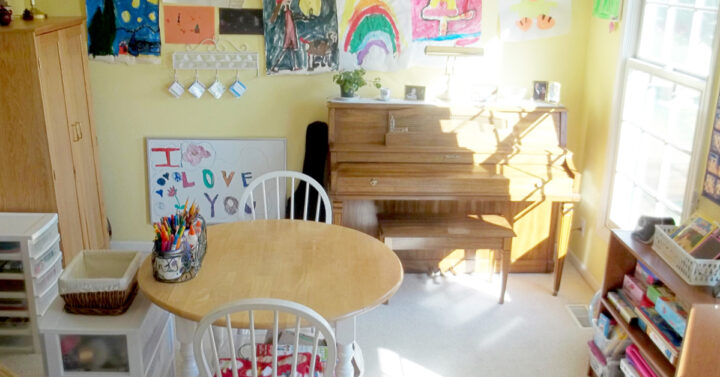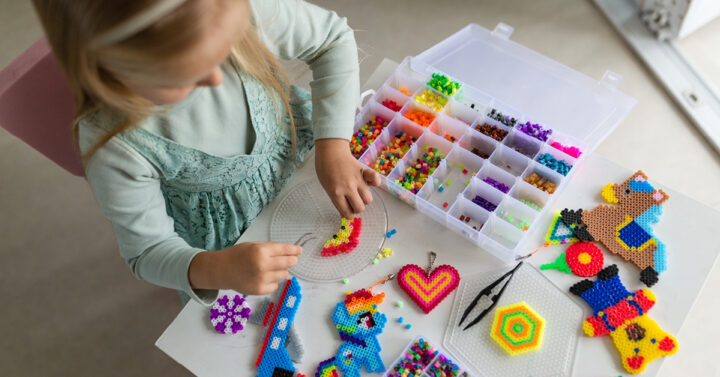Since all of us were educated in some way, we all carry certain expectations regarding what education should look like. I attended public school from kindergarten through college. I then took my teaching degree and taught in various private, Christian, Classical Christian, and Hillsdale model schools.
One might think that my broad experience would be helpful when it came to homeschooling my own daughter. In some ways it has been helpful. In other ways less so. I’ve had to go through my own experience of deschooling in the process. What is deschooling? Deschooling is breaking away from the “school” mindset that permeates our culture. For most homeschoolers, it is an important step that often isn’t discussed enough. So let’s take a look at the school mindset and what deschooling it will look like.
Deschooling The Homeschool Mom
Before we dive into the topic of deschooling, take this quick quiz by responding to each statement below with a “yes” or “no.” Be honest with where you are in your thinking. Keep a running tally of your yes and no responses.
- My relationship with my child has suffered because of the stress of public (or private) school.
- I have a teaching degree.
- It is important to keep with the curriculum scope and sequence in my state so my kids stay on pace with their peers.
- Textbooks offer the best well-rounded education for important subjects like history, science, and math.
- It is important to have a routine with regular schooling hours.
- I attended public schools and was successful.
- I need to keep track of how many minutes and hours my child does each subject so I can be sure she is getting enough learning time.
- My child says he doesn’t like learning.
- My children need to take standardized tests so I am sure they are where they should be academically.
- I know what my child enjoys doing, but it isn’t school-related and school work has to come first before he can do his hobbies.
- I love creating lesson plans, organizing learning activities, and planning out what my child should do.
- My child often ends up in tears over homework.
- My biggest fear is that my child won’t be prepared for college.
- I successfully taught in the public schools.
- I think it is important that we keep the yearly school schedule like the public school families around us so we will fit in.
- Children need lots of direction because they don’t understand what they need for life like an adult does.
- My child is so far behind academically, we are going to have to really push to get him/her caught up to grade level.
- I’m going to start homeschooling a bit this summer to make sure it works and so we can figure out what we are doing.
- It is important to complete all of our curriculum each year or my child will not be prepared for high school and college.
- If I let my child do whatever he wanted, he would never learn anything. He would play all day.
Tally up your results. The more you answered yes, the more committed you are to a school-based mindset. And the more committed you are to the idea of “school,” the more you will probably need to deschool in order to be successful with your homeschooling endeavors.
What Is Deschooling?
Deschooling is the process of breaking away from the “school” mindset that permeates our culture. It shouldn’t be confused with unschooling, an educational philosophy that is focused on children learning without instruction from adults. (I realize that’s a very basic definition of unschooling, but it works for our purposes here.)
Deschooling involves taking time to get away from the public school shoulds and musts that rule our mind (and the minds of our children). Deschooling is breaking away from the thoroughly absorbed idea that education must look a certain way. Deschooling is breaking free from school which is harder for most people than it sounds.
The term took hold in the homeschool community because people were leaving traditional school due to the fact that it clearly didn’t work for their child, but then turned around and “did school” at home because it was all they knew how to do. Then they were surprised, shocked, and dismayed when their homeschool endeavors went down in flames within the first couple of months. This is because most people have never thought about school versus learning or school versus education. Deschooling is part of that process.
Let me break down the above 20 statements a different way. This is how a parent who has been effectively deschooled might phrase them.
- My relationship with my child is more important than when or what we learn.
- I have a teaching degree, but teaching in a classroom is nothing like homeschooling my own child.
- The curriculum scope and sequence in my state was developed to try to educate the masses as efficiently as possible while teaching to the average student in the average classroom. It has very little to nothing to do with real learning with my children in my homeschool.
- Textbooks for subjects like history, science, and math break down huge concepts and complex topics into bite-sized information that can be efficiently disseminated to the masses. The textbooks are geared toward the average teacher teaching the average student in the average classroom to prepare for standardized testing.
- Routines should serve my learner, not the other way around.
- Some people have successfully learned in and graduated from traditional public schools and gone on to live “successful” lives, depending on your definition of learning and success.
- Trying to keep track of the minutes and hours when a homeschool child is learning will drive the average homeschool mother insane. It will also teach a child that learning can only take place when an adult is measuring it.
- Most children resist being dictated to regarding what and when to learn.
- Standardized tests were developed for the educational bureaucracy to prove their own worth and for their own purposes. Standardized testing tells almost nothing about an individual child except whether or not he has successfully navigated the school assembly line procedure.
- I know what my child enjoys doing and even if it isn’t “school,” I make sure she has every opportunity to learn through her interests and gifts.
- I love creating an environment where my child can freely choose to engage with meaningful learning activities.
- My child has been set free from the pointless drudgery of homework.
- I no longer fear the college question because I know that college is not the be-all and end-all of an educational journey. I also know that if college is right for my child that so many homeschoolers have already paved the way that my child will have every opportunity to attend college if we put forth a reasonable effort in that direction.
- I know that teachers like me who have successfully taught in public schools have successfully taught in public schools. Probably 90% of that experience will in no way translate into being an effective homeschool parent.
- While it can make it easier in some ways to keep a general yearly schedule like our neighbors, I am in no way obligated to do so and and am free to set the yearly schedule that works best for our family.
- Children need gentle and thoughtful guidance from their parent(s) who listen to their hopes and dreams and interests.
- My child has heard so often how far behind academically he is in the eyes of the school, he is going to need much love and support to know that he isn’t stupid and that he can learn well at his own pace as we work together.
- I’m going to make sure our family gets a complete break from “school” this summer so we can begin to decompress from the stressful experiences we’ve had with schools. After we spend three or six or nine or twelve months decompressing and casually learning, we’ll be ready to implement a little more structured learning program we all love.
- It is important to create a learning program that works for my student where she is and that will allow her to continue to grow and move forward toward whatever comes next in her life.
- If I let my child do whatever he wants, he (mostly) happily plays and learns all day. Because he is so involved and invested in what he is doing, he remembers so much and is constantly growing and learning.
Do you see the difference?
Deschooling Your Homeschool Family
The general rule of thumb is that for every year a child spent in traditional public (or private) school, you need to deschool for a month. So if you are pulling out your third and fifth grade children, you need to deschool for at least three to five months. Personally, I would NOT include summer break months in that number. If you get out of school in May, I would anticipate deschooling at least through Christmas.
The more you answered “yes” in the first 20 quiz statements, the longer you need to deschool. You may need to deschool an entire school year. If reading that makes you absolutely freak out, you probably need to deschool a lot. Why? Because you are so convinced in your mind that learning = school structure and school subjects.
What Do We Do While We’re Deschooling?
The reality is you could turn your kids loose for a few months and they would be learning every day. As long as you give them opportunities to interact with the world, they will be learning. Do fun stuff and make no mention of learning. There are so many places you can go where your child will learn just by being there. (And resist the temptation to interject and turn everything into a lesson during deschooling so you can feel the activity has “value.” Let them learn on their own!)
Where could you go and what could you do?
- Zoos
- Museums
- Parks
- Documentaries
- Libraries
- Read alouds as a family
- Gardens
- Art museums
- Historical venues
- Parades
- Flea markets
- Cemeteries
- Lakes
- Board games
- Rivers
- Library activities
- Concerts
- Baking and cooking
- County or state fairs
- Puzzles
- Bookstores
- Activities at colleges and universities
- Petting zoos
- Diverse places of worship
- Online activities
- Vegetable gardening
- Orchards and you-pick farms
- Plays
Every single activity on that list will be full of learning activities. If you look at the list and get that panicky feeling that that’s not really learning, then you are still trapped in a school mindset. (You can download a free field trips printable on my site.)
Homeschooling is an amazing opportunity for children and parents. Is it challenging? Yes, it is at times. But deschooling has been found to help many families be more successful as they transition from institutional learning to home education. Deschooling mom is just as important as deschooling the children you are bringing home.









 Around Our Home In May
Around Our Home In May
Very informative! I pulled my children from public school toward the end of 2nd & 3rd grade. I still remember the first article I read on deschooling, I seriously thought it was insane and I refused to even consider it. I plowed right into what I thought was homeschooling, only to find myself in a full on struggle. I definitely made things so much more difficult than they ever had to be. My “school” mindset was destructive and would have led to increasing disaster (even if my children had stayed in public school). I am grateful I finally took the advice to deschool. We all need to deschool, yes as a family; and it is a process. Just working through those statements I could see the difference in how I would have answered before and how I answer now. And this article explains deschooling incredibly well. I am encouraged to continue growing as a homeschool family, and really shedding that structured educational thinking I developed over the years of attending public school. Thank You!